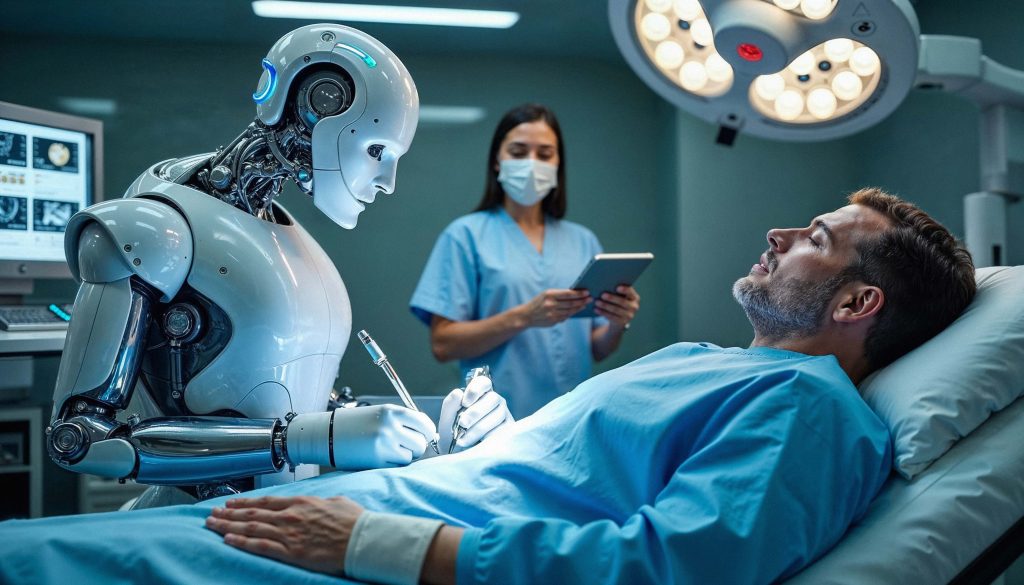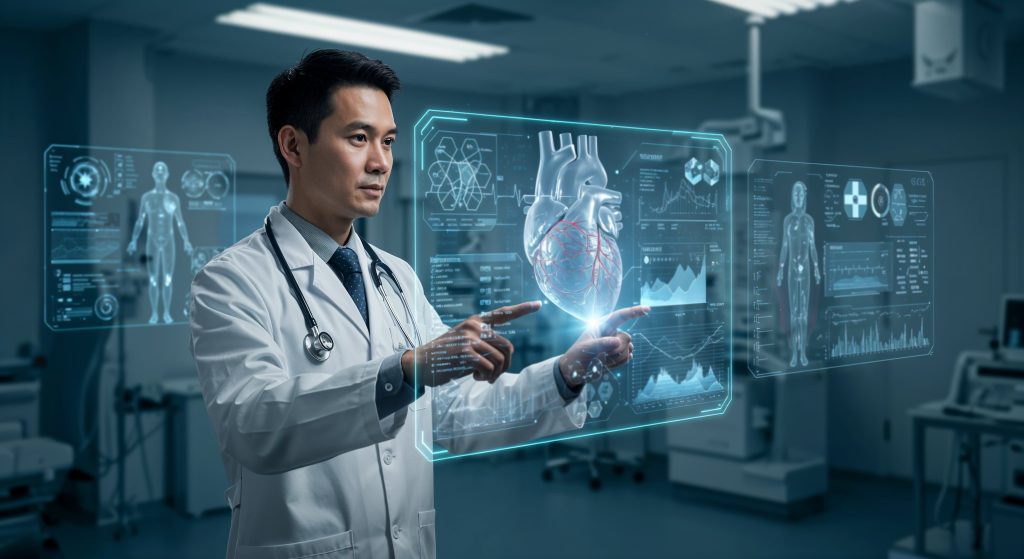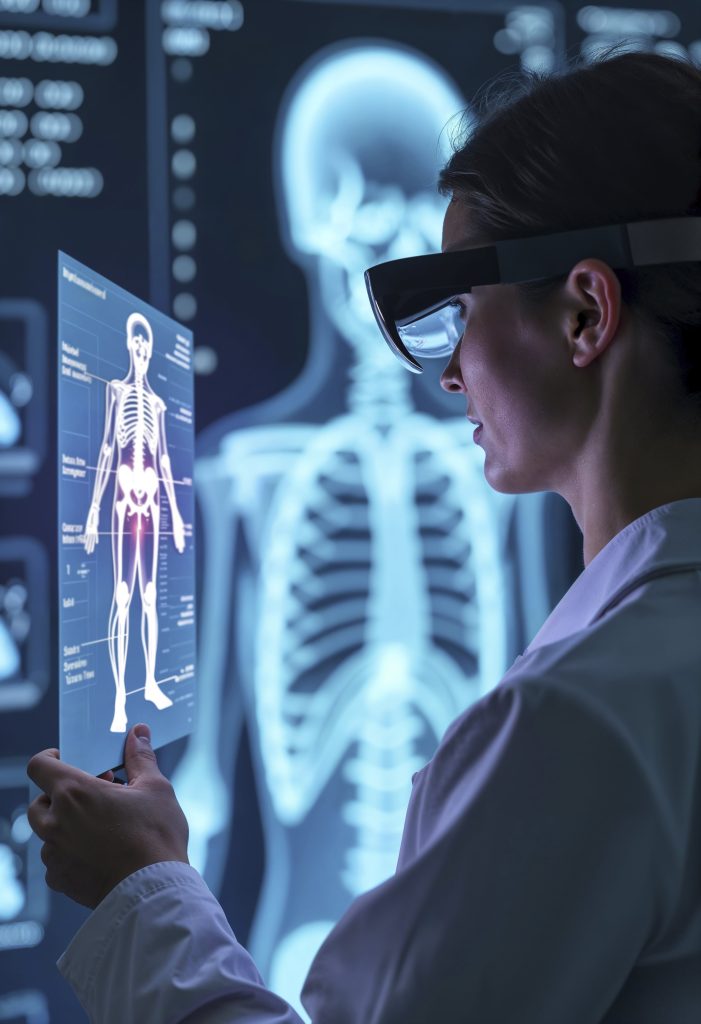
Future of AI in Medicine 2025 Trends
How are businesses going about implementing AI in medicine as it continues to be a popular topic into the new year?
Artificial intelligence has the potential to help close the 4.5 billion people who lack access to basic healthcare services.
Doctors are already using AI tools to identify fractures, prioritize patients, and identify early disease symptoms.
Introduction: The Age of AI in Healthcare
Artificial Intelligence (AI) is altering medicine in front of our very eyes and is no longer just a revolutionary slogan. As 2025 approaches, artificial intelligence will last to transform how medical professionals diagnose illnesses, treat patients, and operate healthcare systems.
AI is playing a vital role in renovating healthcare delivery globally, whether it is through robotic operations support or the ability to predict illnesses before symptoms appear.
The National Health Service (NHS) in the UK has been using AI more and more to improve patient results, smooth-running processes, and accomplish patient loads. The UK is leading the way in implementing AI-driven healthcare solutions thanks to financing rebellion and specialized AI hubs.

AI in Diagnosis
Perhaps the most important impact of AI in medicine has been in the field of diagnosis. By 2025, machine learning algorithms will be able to assess vast amounts of data, including radiological scans and blood tests, to identify illnesses more quickly and precisely than in the past.
NHS hospitals are already using AI-powered tools, such as Google’s DeepMind, to locate early indicators of neurological disorders, breast cancer, and eye ailments. In only a few minutes, these algorithms can evaluate thousands of photos and pinpoint possible trouble spots with remarkable accuracy. For instance, AI algorithms are currently helping radiologists examine mammograms in certain UK institutions, which greatly lowers the number of missed cases and false positives.
AI increases accuracy in addition to speed. It enables earlier diagnosis, which results in better outcomes and more effective therapies by revealing hidden patterns and relationships.
AI in Personalized Medicine
In 2025, artificial intelligence will finally introduce individualize medicine to the broader population, in spite of the fact that the idea has been around for some time. Rather of employing a one-size-fits-all approach, AI allows doctors to individualize treatment plans based onpatient genetic profiles, lifestyle data, and medical histories.
Machine learning models use information from genomic sequencing, apparel medical devices, and electronic health records to recommend the optimal medications, therapies, and preventative actions for each patient.
In the UK, programs like Genomics England are combining genomic and artificial intelligence data to predict the risk of hereditary disorders. In oncology, where AI algorithms are being utilized to develop customized cancer treatment regimens that match the most effective drugs with the appropriate tumor types, this is very important.
AI in Surgery
During an operation, depiction a robot helping a surgeon by evaluating data in real time, adjusting methods, and assuring the best result. It’s happening today, so it’s not science fiction.
By 2025, many sophisticated hospitals will have AI-enhanced surgical robots as regular equipment. They aid as incredibly accurate aides to human surgeons, increasing the accuracy of intricate operations rather than taking their place. AI aids in cardiac and knee replacement procedures by dropping invasiveness, guiding tools, and producing 3D representations of the patient’s anatomy.
AI-powered robotic surgery stages are being used by a number of NHS trusts in the UK to improve decision-making during treatments. These methods improve patient safety, decrease the likelihood of problems, and speed up recovery. AI is making surgery more accurate and less dangerous.

AI in telemedicine
During the pandemic, remote care crushed, and by 2025, artificial intelligence has made telemedicine a leading force. Real-time data analysis from wearable devices, such as glucose trackers and heart rate monitors, is now possible thanks to AI algorithms, which inform patients and physicians of irregularity before they become serious problems.
Initial discussions, case arrange, and even mental health symptom monitoring are being handled by AI-powered chatbots. Based on user input, these virtual assistants can speak in natural language and provide dependable medical advice.
Challenges in Data Privacy and Ethics
AI-powered telehealth platforms in the UK are increasing access to needy groups, especially in rural areas. By enabling chronic patients, such as those with diabetes or hypertension, to run their conditions from home, the NHS’s AI-powered remote monitoring programs are lowering hospital visits and enhancing quality of life.
AI in medicine presents significant ethical and privacy issues in spite of its many advantages. How can we guarantee the responsible use of patient data? Can we rely on AI systems to make decisions that could change our lives?
Regulation and clarity are essential. Strict frameworks for AI in healthcare are being implemented by governments, including the UK, in 2025. For instance, before deploying new AI tools, the NHS AI Lab closely cooperate with regulatory agencies to test them for efficacy, safety, and fairness.
Initiate public trust is essential. Patients need to know that AI is used to supplement human care, not to replace it, and that their data is secure. AI’s long-term success in medicine will depend on how well it strikes a balance between creativity and liability.
AI in Drug Discovery and Medical Research
AI is also transforming the process of finding novel treatments. Conventional drug development is expensive and time-consuming. However, by simulating drug interactions and identifying promising compounds in silico, artificial intelligence is drastically reducing time and cost by 2025.
By predicting which molecules are most likely to be effective against particular diseases, machine learning algorithms allow researchers to concentrate only on the most promising candidates. AI has occasionally aided in the creation of new medications in a matter of months.
Businesses in the UK are leading the way in AI-driven research. Clinical trials are being expedited and research precision is being improved through partnerships between biotech companies and NHS data repositories.
AI is assisting in the faster, more accurate, and less expensive discovery of cures.
What Will AI in Healthcare Do Next?
Further integration of AI in medicine is anticipated in the future. AI will continue to close gaps, increase productivity, and customize care in everything from hospital corridors to home health monitoring. But human oversight will always be necessary because AI is a tool, not a substitute for empathy or sound judgment.
The foundation for widespread AI in medicine adoption in the UK by 2030 is being laid by programs like the NHS Long Term Plan. Attractive patient care, assisting medical professionals, and making AI tools reliable and accessible are the main goals.
Collaboration—between people and technology, between innovation and regulation, and between possibilities and real-world results—will be the focus of the next five years.

Conclusion
Medical possibilities are being redefined by AI. By 2025, it will have enlarge access to care, automated administrative tasks, personalized treatment plans, and earlier disease diagnosis. AI in medicine is authorizing physicians in the UK and elsewhere, not replacing them. The current challenge is to exercise this authority in a way that is inclusive, moral, and responsible.
One thing is certain as we proceed: AI is the present, not the future, of medicine. It’s here to stay.
